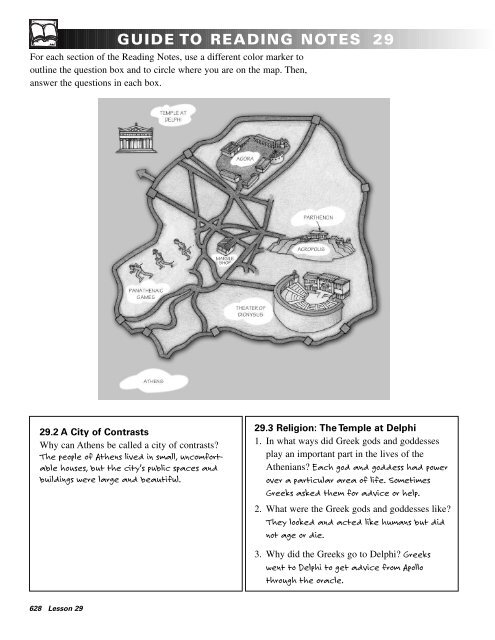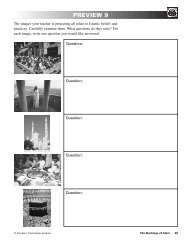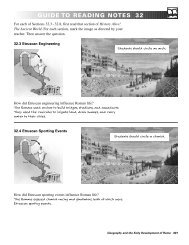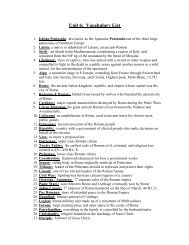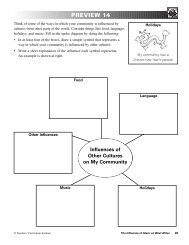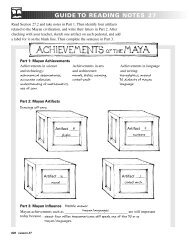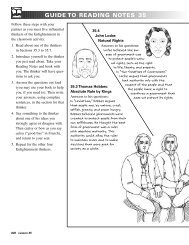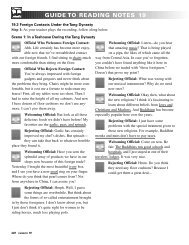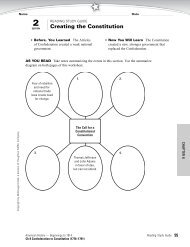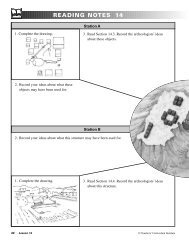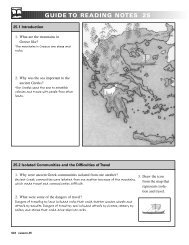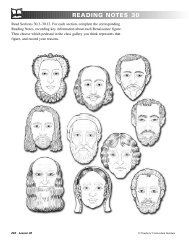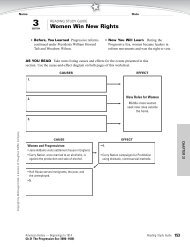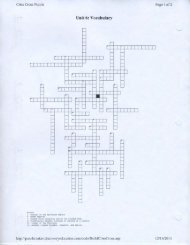CH 29: Teacher Notes
CH 29: Teacher Notes
CH 29: Teacher Notes
Create successful ePaper yourself
Turn your PDF publications into a flip-book with our unique Google optimized e-Paper software.
GUIDE TO READING NOTES <strong>29</strong><br />
For each section of the Reading <strong>Notes</strong>, use a different color marker to<br />
outline the question box and to circle where you are on the map. Then,<br />
answer the questions in each box.<br />
<strong>29</strong>.2 A City of Contrasts<br />
Why can Athens be called a city of contrasts?<br />
The people of Athens lived in small, uncomfortable<br />
houses, but the city’s public spaces and<br />
buildings were large and beautiful.<br />
<strong>29</strong>.3 Religion: The Temple at Delphi<br />
1. In what ways did Greek gods and goddesses<br />
play an important part in the lives of the<br />
Athenians? Each god and goddess had power<br />
over a particular area of life. Sometimes<br />
Greeks asked them for advice or help.<br />
2. What were the Greek gods and goddesses like?<br />
They looked and acted like humans but did<br />
not age or die.<br />
3. Why did the Greeks go to Delphi? Greeks<br />
went to Delphi to get advice from Apollo<br />
through the oracle.<br />
628 Lesson <strong>29</strong>
GUIDE TO READING NOTES <strong>29</strong><br />
<strong>29</strong>.4 Architecture: The Acropolis<br />
1. What was the Parthenon?<br />
The Parthenon was a temple built to<br />
honor Athena.<br />
2. On this sketch of the Parthenon, label these<br />
parts: pediment, frieze, Doric column.<br />
frieze<br />
pediment<br />
Doric column<br />
<strong>29</strong>.5 Sculpture: A Marble Workshop<br />
1. How did Athenian sculpture change over<br />
the years?<br />
Sculpture became more realistic. Statues were<br />
sculpted in natural poses and showed detailed<br />
muscles, hair, and clothing.<br />
2. Who was Phidias? What did he do?<br />
He was Athens most famous sculptor. He designed<br />
the figures at the top of the Parthenon and<br />
sculpted the statue of Athena that was inside<br />
the Parthenon.<br />
<strong>29</strong>.6 Drama: The Theater of Dionysus<br />
List three ways Greek drama differed from plays<br />
and movies of today.<br />
Greek drama differed from plays and movies of<br />
today in these ways:<br />
1. It relied upon the chorus to help explain<br />
and expand the story.<br />
2. It had no women actors.<br />
3. It was held in outdoor theaters.<br />
<strong>29</strong>.7 Philosophy: The Agora<br />
1. What do philosophers do?<br />
They talk about the world around them, nature,<br />
the meaning of life, justice, truth, and beauty.<br />
2. How did Socrates try to teach others?<br />
He asked people questions that forced them to<br />
think about their beliefs.<br />
3. What happened to Socrates?<br />
He was put to death. His enemies accused him of<br />
not honoring the gods and leading young people<br />
into error and disloyalty.<br />
<strong>29</strong>.8 Sports: The Panathenaic Games<br />
1. What was the purpose of athletic events<br />
in Greece? They showed the importance of<br />
a healthy body and honored the gods and<br />
goddesses.<br />
2. Describe one Panathenaic event that is part of<br />
our present Olympics. Students might<br />
describe footraces, boxing, or wrestling.<br />
3. Describe one Panathenaic event that is not part<br />
of our present Olympics. Students might<br />
describe chariot races, races in full armor,<br />
or the pancratium.<br />
The Golden Age of Athens 6<strong>29</strong>


